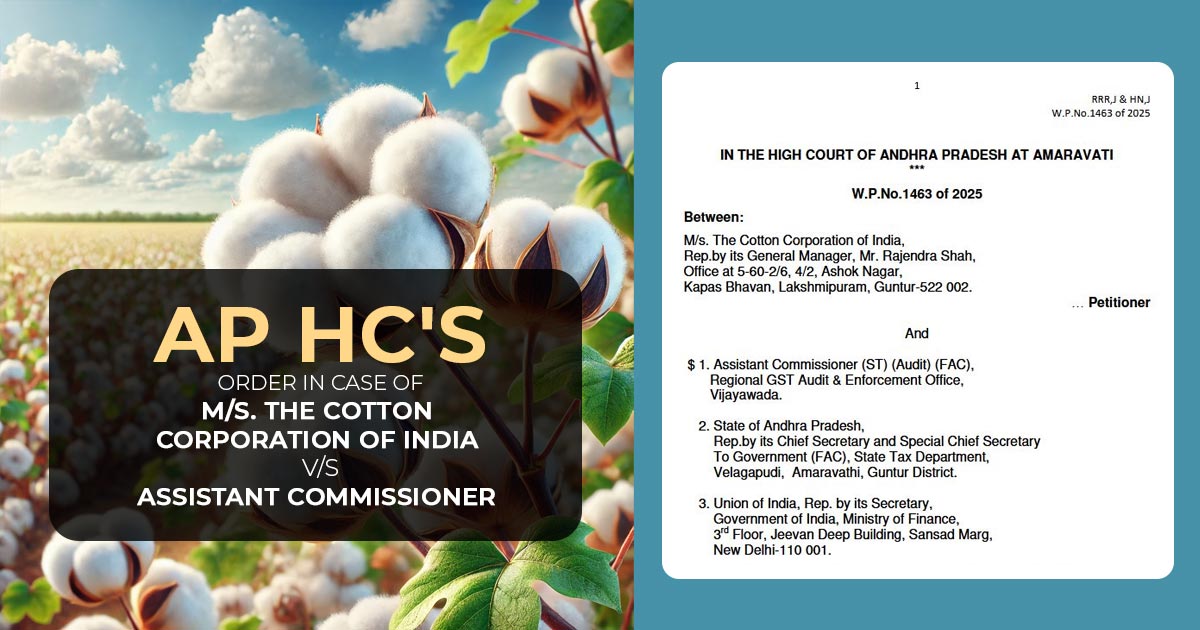
It was ruled by the Andhra Pradesh High Court that the allowed time set out under 73(2) of the AP GST Act for issuance of show cause notice concerning alleged short payment of tax, etc. is mandatory in nature.
A division bench of Justices R Raghunandan Rao and Harinath N, any breach of that period cannot be condoned and would render the show cause notice pointless.
It noted that “The GST Act, has put in place certain protections for taxpayers. One of the primary protections is that orders cannot be passed against the taxpayers, beyond the periods stipulated in the Act. It is settled law that these periods of limitation are mandatory and no orders can be passed beyond the periods set out in the Act. In such a situation, it would be difficult to hold that the stipulation as to the period of initiation, of such proceedings, by issuance of a show cause notice, would only be directory and not mandatory.”
In this case, the applicant has contested the SCN on 30.11.2024, issued to it under section 73(1) r/w Rule 142 of the APGST Rules, concerning alleged short payment of tax, etc. about the assessment year 2020- 2021. It claimed that the notice was limited to time.
It claimed that the provisions of Section 73(2) of the GST Act use the word “shall” and that it shall need to be treated as an obligatory requirement.
Section 73(2) of the APGST Act specifies that the notice under subsection(1) which forms the assessment proceedings, shall required to be issued at least three months before the time limit established in Section 73(10) for issuance of the order.
Section 73(10) defines that the assessment order would need to be issued within 3 years from the deadline for providing of annual return for the stated financial year. While the Government Pleader claimed that the provisions of section 73(2) could at best be regarded as a directory need and not a compulsory need whose breach shall direct the proceedings no est.
Also, the applicant claimed that a conjoint reading of Section 73(2) with Rule 81-A of the CGST Rules would make it clear that the due date for issuance of a Show Cause Notice (SCN), for the AY 2020-2021 would be the 28th day of November 2024.
The same is beyond time and is non-est since the SCN was issued dated 30.11.2024. Rule 81-A specifies that the deadline to file the annual return, u/s 44 of the GST Act, for the financial year 2020- 2021 would be the 28th day of February 2022. The GP cited that a “month”, as prescribed u/s 73, would signify “a calendar month”.
Read Also: The Clustering of GST Show Cause Notices Contradicts the Intent of Section 73
As the 28th of February is the end of February, the due date of issuance of a notice shall be the 1st of December, 2024 or at the worst 30th of November, 2024.
The High Court at the outset noted that when a period available for the specific measure is mentioned as per the months then the same shall be directed that the related month would be the cutoff date. Reliance was placed on Himachal Pradesh and Another vs. Himachal Techno Engineers and Another (2010) where the Supreme Court ruled that a `month’ does not direct to a period of 30 days but directs to the actual period of a calendar month.
“If the month is April, June, September or November, the period of the month will be thirty days. If the month is January, March, May, July, August, October or December, the period of the month will be thirty-one days. If the month is February, the period will be twenty-nine days or twenty-eight days depending upon whether it is a leap year or not,” it illustrated.
In the current case, since the cutoff date for issuing an order was 28.02.2024, the Court said, “The three-month period which would elapse from this date would be 28.11.2024. Since the notice was issued on 30.11.2024, it would be beyond the time stipulated under Section 73(2) of the GST Act.”
Also Read: GST Section 73 Restricts 100% Penalty on Assessee If SCN is Issued
The Court concerning the mandatory or discretionary nature of the timeline u/s 73, mentioned that the objective for which these limitations have been cited under the act is to safeguard the taxpayer’s interest. Therefore its objective could not be just discretionary, the Court noted.
“Section 75 of the GST Act, stipulates that the taxpayer is not only entitled to a notice before any assessment is carried out but also the right of personal hearing, irrespective of whether such personal hearing is requested. When there is a possibility of an adverse order being passed against the taxpayer, the facility of obtaining at least three adjournments for personal hearing etc. The said provisions, protecting the interest of the taxpayer, would be rendered otiose if notice should permitted to be sent without a minimum waiting period. The said protections can then be bypassed by the authorities issuing a show cause notice within a week or 10 days and calling upon the payer to put forth his objections in that shortened time. That does not appear to be intent of the provisions of Section 75(2) or Section 73 (10) of the GST Act.”
Therefore the petition was permitted and SCN was quashed.
| Case Title | M/s. The Cotton Corporation of India vs. Assistant Commissioner |
| Citation | W.P.No.1463 of 2025 |
| Date | 05.02.2025 |
| Counsel for Petitioner | Karthik Ramana Puttamreddy |
| Counsel for Respondent | G.P. for Commercial Tax |
| Andhra Pradesh High Court | Read Order |









